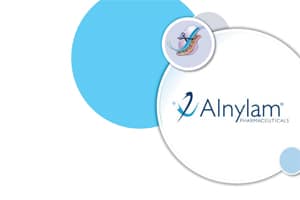 Shares in RNA interference specialist Alnylam are rocketing ahead after the APOLLO trial provided its first late-stage win, and evidence that its gene-silencing platform can deliver commercial products.
Shares in RNA interference specialist Alnylam are rocketing ahead after the APOLLO trial provided its first late-stage win, and evidence that its gene-silencing platform can deliver commercial products.
APOLLO showed that Alnylam’s lead RNAi therapy patisiran is effective as a treatment for the rare disorder hereditary ATTR amyloidosis with polyneuropathy , and critically was well-tolerated by patients, sparking a 50%-plus rise in the US biotech’s share price.
Safety is an important finding as patient deaths have affected some of the firm’s other programmes, including most recently haemophilia candidate fitusiran which had a trial halted as a result, and revusiran for a rare cardiac condition which was dropped last year.
Armed with the new data, Alnylam and its partner for patisiran Sanofi say they hope to file for approval of the gene-silencing drug before the end of the year, with an EU filing due a little later in 2018.
RNAi therapies – which switch off the activity of specific messenger RNAs and so can block the formation of the proteins coded by genes with great precision – have long been touted as an important new class of therapies. It is estimated that existing small-molecule and biologic drugs can only address around a fifth of the genes in the human genome, but focusing on RNA renders practically all gene products drug targets.
Despite many years of research none have yet reached the market, however, thanks to delivery challenges, specificity issues and the aforementioned safety issues, which have exacerbated the usual challenges associated with new drug development. Roche’s decision to exit the field some years back dampened enthusiasm, but smaller players such as Alnylam have stuck with the technology and Roche itself subsequently re-entered the field.
“We are very proud to report the first ever positive phase III results for an RNAi therapeutic, marking the potential arrival of an entirely new class of medicines,” said the biotech’s chief executive John Maraganore.
“This moment is the culmination of a 15-year journey of tireless work by countless contributors who have overcome enormous scientific and business challenges to make RNAi therapeutics a reality,” he added.
The 225-patient Apollo trial compared a dose of patisiran given every three weeks to a matched placebo over an 18-month period, and showed that hATTR amyloidosis patients on the RNAi drug showed significant reductions in the progressive nerve damage that characterises the disease. Patisiran also improved secondary measures such as muscle strength, walking tests and quality of life scores.
Alnylam’s success in the phase III trial proved to be a dampener for Ionis Pharmaceuticals, which is developing antisense-based drug inotersen for this type of familial amyloid polyneuropathy (FAP). The company shares fell yesterday on the APOLLO trial news, which comes a month after Ionis lost GlaxoSmithKline as its partner for inotersen as part of the big pharma company’s decision to back away from rare disease therapies.




